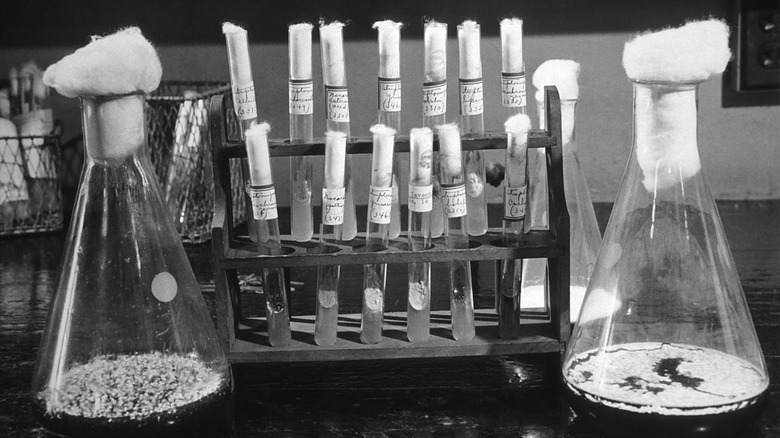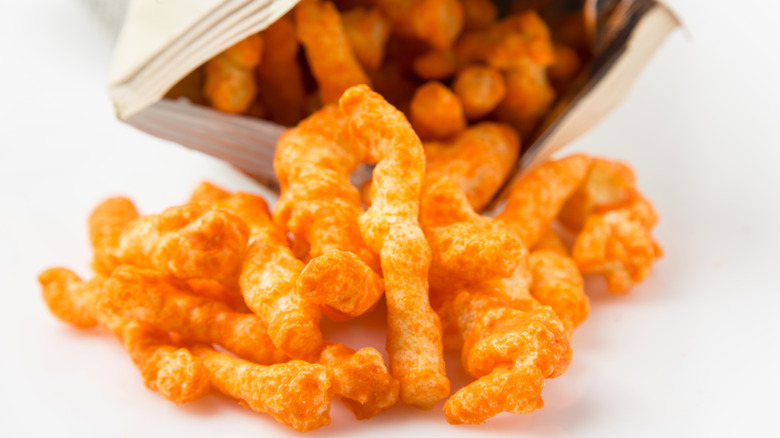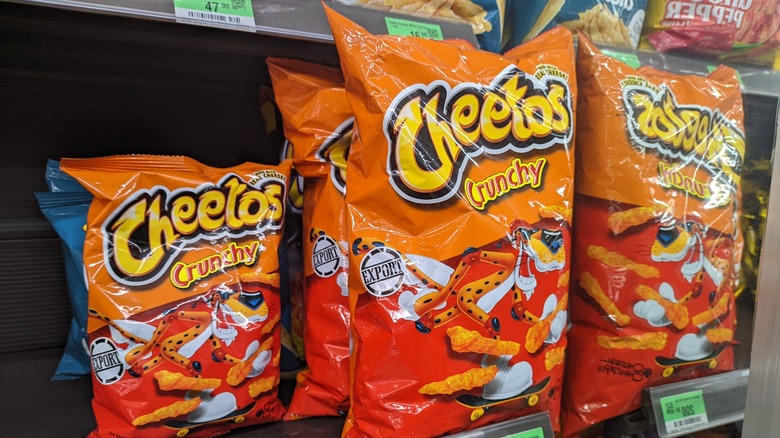How WWII Food Science Helped Create This Iconic Snack
Inspiration can be found in the most unlikely places. When it comes to inspiring new food items, the military has a larger influence on snack-food innovation than you might expect. For example, food scientists during World War II were tasked with finding ways to feed an extremely large number of soldiers for as little money as possible while remaining nutritious and sustainable. The results of this research lead to surprising, unforeseen snack foods like the beloved corn puffs known as Cheetos. The cheesy snack we still eat today has World War II to thank for inventing its key ingredient: cheese powder.
Since arriving on the scene in the late 1940s, Cheetos have dominated the cheesy snack food market. According to a 2017 report from Statista, Cheetos were ranked the number-one cheesy snack brand in the United States by a rather large margin. Long before Flamin' Hot Cheetos' controversial creation, and before Chester's Puffcorn arrived on snack shelves, there were simply the original crunchy Cheetos, which promised a tasty, cheesy bite (and orange-stained fingerprints afterward). Fun fact: The orange powder that gives Cheetos their iconic coating of cheesy dust is called "Cheetle." That same tasty dusting and cheese-like flavoring were originally invented in a dehydration mishap conducted by food scientists during World War II.
Cheese dust was a happy accident discovered by military-funded food research
Processed cheese and cheese-flavored spreads produced by what we know today as the Kraft company became very popular amongst soldiers during World War I. When the second World War began and food scientists began experimenting with ways to get foods to soldiers in quick and easy ways, cheese was, of course, on their menu.
While the cheesy taste of home continued to be in high demand from soldiers abroad, grocery manufacturers and food scientists alike struggled to understand the right way to store and ship the temperamental dairy product without running into major spoilage problems while the product was shelved for long periods of time. The high fat content in cheese also reacts poorly to major temperature changes, which means it needs to remain refrigerated and well-sealed when transported and stored. This process is extremely expensive to maintain, so regular, full-fat cheese wasn't exactly an ideal option for the military.
This is when the idea of dehydration came into play. When scientists first applied this method to cheese, however, it crumbled into a dry powder rather than solidifying or melting as they expected — this was the very cheese dust that would later be sprinkled onto chips and sold as Cheetos. USDA dairy scientist George Sanders first patented this surprising discovery in 1943, and it was sold to the military as a cheap, easy way to create cheesy foods without worrying about expensive shipping costs or temperamental storage solutions.
Cheetos were created as a way of revamping leftover military food
The end of the war left food manufacturing companies with a surplus of rations that weren't easy to sell to civilians — few people were still reaching for things like potato flakes, dried eggs, and dehydrated cheese powder. The ingredients were, however, enticing to grocery manufacturers who were sold the military's leftovers at a discount. In 1948, the founder of the Frito company and long-time military supplier Charles Elmer Doolin utilized this surplus of cheese powder to introduce the snacking world to Cheetos. The snack was originally created as a cheesy alternative to the popular cornmeal chip, Fritos.
In 1961, Cheetos Puffs were invented with a different crunchy texture but the same cheesy, orange-dusted goodness. Whether you prefer the traditional crunchy chips or cheesy puffs, and whether or not you hold fond memories of discontinued Cheetos types that we likely won't be seeing again, just know that none of it would have been possible without the accidental discovery of cheese powder, which was fueled by curious food scientists and a militant love of cheese.


